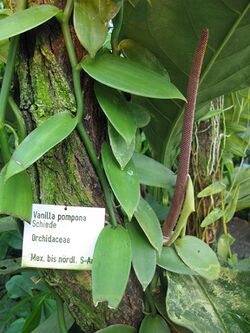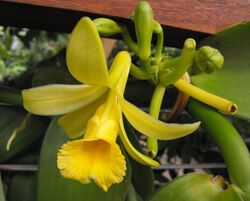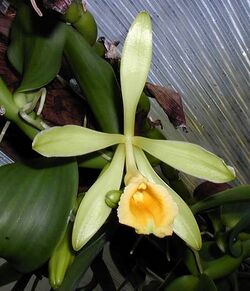Biology:Vanilla pompona
| Vanilla pompona | |
|---|---|

| |
| Scientific classification | |
| Kingdom: | Plantae |
| Clade: | Tracheophytes |
| Clade: | Angiosperms |
| Clade: | Monocots |
| Order: | Asparagales |
| Family: | Orchidaceae |
| Subfamily: | Vanilloideae |
| Genus: | Vanilla |
| Species: | V. pompona
|
| Binomial name | |
| Vanilla pompona Schiede
| |
| Synonyms[2] | |
| |
Vanilla pompona is a species of vanilla orchid. It is native to Mexico and northern South America,[3] and is one of the sources for vanilla flavouring, due to its high vanillin content.
Vanilla pompona found in the Peruvian Amazon has been tested using HPLC analysis showing a concentration of vanillin content up to 9.88g/100g[4] making it suitable for the food or cosmetic industry.
Description
Like all members of the genus Vanilla, V. pompona is a vine. It uses its fleshy roots to support itself as it grows. Its leaves and stems are generally thicker than in V. planifolia and V. phaeantha.[5]
Pollination
V. pompona is one of the few Vanilla species for which there is definitive identification of the agents responsible for pollination; a study found that males of a medium-sized orchid bee, Eulaema cingulata, remove and transfer pollen of V. pompona in Peru, apparently while they are searching for nectar that the flowers do not possess.[6] Other bee species visit the flowers, but larger species cannot fit inside to reach the floral reproductive organs, and smaller species do not make physical contact with the stigma; of several observed floral visitors, only E. cingulata was within the necessary size range to accomplish pollen transfer.[6]
References
- ↑ Herrera-Cabrera, B.E.; Hernández, M.; Vega, M.; Wegier, A. (2020). "Vanilla pompona". IUCN Red List of Threatened Species 2020: e.T105878897A173977322. doi:10.2305/IUCN.UK.2020-2.RLTS.T105878897A173977322.en. https://www.iucnredlist.org/species/105878897/173977322. Retrieved 18 November 2021.
- ↑ The Plant List: A Working List of All Plant Species, http://www.theplantlist.org/tpl1.1/record/kew-211961, retrieved 26 January 2016
- ↑ e-monocot.org, http://e-monocot.org/taxon/urn:kew.org:wcs:taxon:211961, retrieved 26 January 2016
- ↑ vanillapompona.com, http://vanillapompona.com, retrieved 26 January 2016
- ↑ James D. Ackerman, "Vanilla Miller, Gard. Dict. Abr., ed. 4. vol. 3. 1754", Flora of North America, 26, http://www.efloras.org/florataxon.aspx?flora_id=1&taxon_id=134375
- ↑ 6.0 6.1 Watteyn, C., Scaccabarozzi, D., Muys, B., Van Der Schueren, N., Van Meerbeek, K., Guizar Amador, M. F., Ackerman, J. D., Cedeño Fonseca, M. V., Chinchilla Alvarado, I. F., Reubens, B., Pillco Huarcaya, R., Cozzolino, S., & Karremans, A. P. (2022). Trick or treat? Pollinator attraction in Vanilla pompona (Orchidaceae). Biotropica 54: 268– 274. https://doi.org/10.1111/btp.13034
External links
 Media related to Vanilla pompona (category) at Wikimedia Commons
Media related to Vanilla pompona (category) at Wikimedia Commons
Wikidata ☰ Q292737 entry
 |




